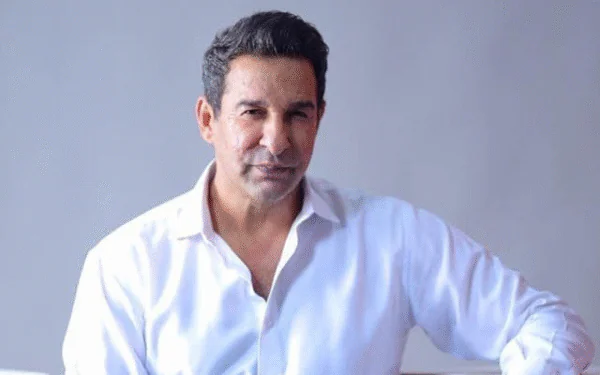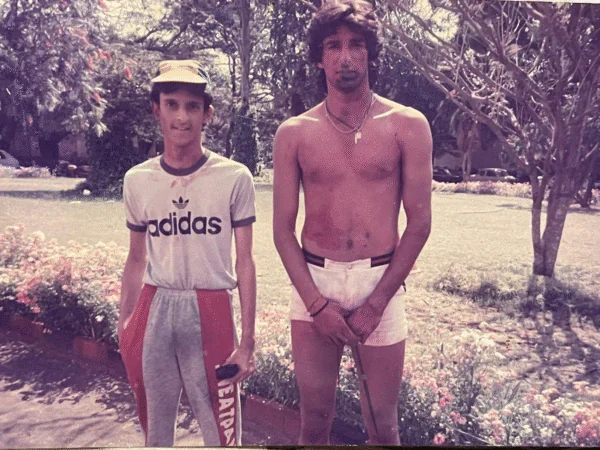Wasim Akram based on NeemTime research
Who is Wasim Akram (Biography/Personal Details)
Wasim Akram, born on June 3, 1966, in Lahore, Pakistan, is a globally celebrated former cricketer widely regarded as one of the greatest left-arm fast bowlers in cricket history.
Known as the “Sultan of Swing,” Akram revolutionized fast bowling with his unmatched ability to swing the ball both ways at high pace.
He made his international debut for Pakistan in 1984 at just 18 years old, and quickly became the spearhead of Pakistan’s bowling attack.
Akram’s career spanned over 19 years, during which he represented Pakistan in 104 Tests and 356 One Day Internationals, taking more than 900 wickets across both formats.
His record of 502 ODI wickets stood unchallenged for years, earning him a place among the greatest bowlers in limited-overs history.
Wasim was also a capable batsman, famously scoring an unbeaten 257 runs against Zimbabwe in 1996, one of the highest scores by a No. 8 batsman in Test cricket.
He served as Pakistan’s captain, leading the national team to several memorable victories, including the 1999 World Cup final.
After retiring in 2003, Akram transitioned into commentary, coaching, and media, becoming one of the most respected voices in cricket broadcasting.
He was inducted into the ICC Cricket Hall of Fame in 2009, cementing his legacy as one of the sport’s true icons.
As of 2025, Wasim Akram remains a prominent figure in world cricket, known for his sharp analysis, mentoring roles, and charitable initiatives.
Early Life Highlights of Wasim Akram (Background/Childhood)
Wasim Akram was born in Lahore, Punjab, into a middle-class Punjabi family with no prior history in professional sports.
His father, Chaudhry Muhammed Akram, was a successful businessman who encouraged Wasim’s education before recognizing his talent for cricket.
Akram attended Government Islamia College, Civil Lines, Lahore, where his cricketing skills began to draw serious attention.
Initially, he played as a batsman, only turning to fast bowling after his coaches noticed his natural pace and movement with the ball.
His raw talent was discovered during local club matches, leading to an invitation to the Pakistan Under-19 trials in the early 1980s.
Akram was largely self-taught, often practicing alone with a tennis ball, which helped him develop his unorthodox wrist position and deceptive swing.
His selection for a Test debut against New Zealand in 1985 came after a remarkable domestic performance where he took nine wickets in an innings.
Growing up in an era with limited training facilities, Wasim developed his craft through sheer perseverance and street cricket experiences.
His early mentors included cricketing greats like Javed Miandad and Imran Khan, who helped refine his bowling discipline.
These formative years shaped Wasim into a mentally strong, creative, and fearless fast bowler — traits that would define his international career.
Current Life Highlights of Wasim Akram (Career/Other Work)
As of 2025, Wasim Akram remains one of the most influential figures in global cricket media, appearing regularly as an expert analyst on major networks.
He has served as a coach and mentor for several T20 franchises, including teams in the Pakistan Super League (PSL) and the Indian Premier League (IPL).
Akram has worked with young Pakistani fast bowlers, nurturing talents like Shaheen Afridi and Haris Rauf, who credit him for refining their skills.
Beyond cricket, he is a motivational speaker and has delivered keynote speeches worldwide on leadership, discipline, and resilience.
In 2022, he released his autobiography, “Sultan: A Memoir,” which candidly discussed his life, career, and personal battles.
Wasim is also a philanthropist, actively involved in supporting diabetes awareness campaigns after being diagnosed with the condition in 2003.
His presence as a brand ambassador for sportswear and health products continues to make him one of Pakistan’s most recognized public figures.
Akram has made cameo appearances on Pakistani television talk shows, promoting sportsmanship and the development of grassroots cricket.
In 2025, he was appointed as an advisor to the Pakistan Cricket Board (PCB) to help modernize bowling programs across all levels.
He remains a bridge between generations of cricketers, respected globally for his cricketing intellect and enduring charisma.
Personal Life Highlights of Wasim Akram (List of Romantic Relationships/List of Family Members)
Wasim Akram was first married to Huma Mufti in 1995, and the couple shared a deep bond until her tragic passing in 2009 due to a sudden illness.
From his first marriage, Akram has two sons — Taimur and Akbar, both of whom have been raised with strong academic and sporting values.
In 2013, Wasim married Shaniera Thompson, an Australian social worker he met during a charity event in Melbourne.
Their marriage symbolized a beautiful cross-cultural union, celebrated in both Pakistan and Australia.
Together, they have a daughter named Ayla Akram, born in 2014, who is often seen with them during public appearances.
Shaniera has since become a beloved figure in Pakistan, involved in social welfare campaigns and environmental activism.
Akram and his family divide their time between Karachi and Melbourne, balancing personal life with his global commitments.
Despite his fame, Wasim is known for maintaining a low-key and grounded lifestyle, often prioritizing family privacy.
He has spoken openly about coping with grief after Huma’s death and how family support helped him rebuild his emotional strength.
As of 2025, Wasim and Shaniera continue to represent a modern, compassionate power couple, admired for their social work, humility, and shared love for Pakistan.
Wasim Akram Shirtless

Wasim Akram Shirtless 5

Wasim Akram Shirtless 4

Wasim Akram Shirtless 3

Wasim Akram Shirtless 2

Wasim Akram Shirtless
Wasim Akram Height / How to Get Body Like Wasim Akram
Wasim Akram stands tall at 6 feet 2 inches (1.88 meters), a height that contributed significantly to his bowling leverage and ability to extract bounce from any pitch.
His athletic build during his playing days combined lean muscle with endurance, making him one of the fittest cricketers of his generation.
Akram’s fitness routine emphasized cardiovascular conditioning, particularly running and swimming, to maintain stamina for long bowling spells.
He avoided excessive gym bulking, focusing instead on functional strength training to keep his shoulders, back, and legs flexible.
His diet plan centered on high protein intake, controlled carbs, and hydration, which he continues to follow post-retirement to manage his diabetes.
To build a physique like Wasim Akram, one should prioritize cricket-specific workouts — sprint drills, medicine ball throws, and resistance band exercises.
He has often stated that consistency and discipline were more important than intensity when it came to maintaining his fitness over decades.
Even in his late 50s, Akram is known for his ageless fitness, regularly posting social media clips of his morning runs or gym sessions.
His philosophy on fitness is simple: “Train smart, eat clean, and rest enough to recover,” a mantra he attributes to his longevity.
As of 2025, Wasim continues to inspire young athletes with his fit and energetic lifestyle, proving that discipline transcends age.
Interview Quotes of Wasim Akram (where/when)
In an interview with BBC Sport (2024), Wasim Akram said, “Swing bowling isn’t about power — it’s about rhythm, wrist position, and patience.”
Speaking to Geo News in 2023, he remarked, “My greatest victory wasn’t a match — it was learning to live with discipline after retirement.”
During a 2022 Sky Sports podcast, he discussed leadership, saying, “A true captain inspires by calmness, not chaos.”
At a Melbourne charity event in 2021, Akram reflected, “Cricket taught me teamwork, but diabetes taught me resilience.”
In a Cricinfo feature (2020), he shared, “Imran Khan made me believe that a boy from Lahore could become the world’s best fast bowler.”
Talking to ESPN in 2022, he humorously noted, “The batsmen feared the swing; my teammates feared my stare when they dropped a catch.”
In his autobiography tour interview (2023), he said, “Every ball I bowled was a conversation — between me, the pitch, and the batsman.”
On a PCB documentary in 2024, Akram revealed, “The best lesson cricket gave me was humility — you can’t win every day.”
During a CNN interview (2023), he mentioned, “Pakistan cricket will always produce fast bowlers; it’s in our DNA.”
In a 2025 motivational seminar, he concluded, “Perseverance is the real swing — it turns struggles into success.”
TV / Movie Quotes of Wasim Akram (where/when)
In the documentary “The Sultan of Swing” (2021), Akram said, “I didn’t choose swing bowling — swing chose me.”
During a 2022 PSL broadcast, he joked, “Fast bowling is like a marriage — full of patience, strategy, and unexpected bouncers.”
Appearing on The Late Night Show Pakistan (2023), he quipped, “When I was young, batsmen feared me; now my sugar levels do.”
On “Game On Hai” (2022), Akram said, “Every over tells a story — mine usually began with a plan and ended with a wicket.”
In the ESPN special “Masters of Pace” (2020), he reflected, “Pace without control is chaos — art lies in balance.”
In the Bollywood sports talk show “Inside Edge Chat” (2021), he remarked, “Fast bowling isn’t about anger; it’s about controlled aggression.”
On the PSL 2024 commentary panel, he said, “You can’t coach instinct, but you can polish discipline.”
During the 2023 ICC Legends Roundtable, he humorously said, “I’m not retired — I’ve just stopped chasing batsmen.”
On Pakistan Television’s “Legends Rewind” (2022), he said, “My greatest reward wasn’t the wickets — it was respect.”
In Amazon Prime’s “Cricket Icons” (2024), he shared, “The ball is my brush, and the pitch is my canvas.”
Controversies/Scandals of Wasim Akram
In the late 1990s, Wasim Akram’s name was mentioned during Pakistan’s match-fixing investigations, though he was never found guilty of wrongdoing.
His captaincy in the 1996 and 1999 World Cups came under scrutiny, with critics accusing him of favoritism — claims he has repeatedly denied.
Akram faced a public feud with teammate Waqar Younis, which became one of Pakistan cricket’s most talked-about rivalries before reconciliation years later.
In 2003, he was criticized for missing matches due to fitness concerns, which some fans misinterpreted as a lack of commitment — a claim he clarified later.
After retirement, his autobiography “Sultan: A Memoir” (2022) sparked headlines for revealing personal details about his struggles with addiction post-career.
He was occasionally trolled on social media for his criticism of Pakistan’s cricket management, though most appreciated his honest insights.
In 2015, Akram survived a road rage shooting incident in Karachi, which drew global attention and security concerns for Pakistani athletes.
Some conservative critics targeted his second marriage to Shaniera Thompson, but the couple’s charm quickly won over fans.
In 2023, a viral clip from a talk show, where he jokingly mocked modern-day players’ fitness levels, stirred a brief online debate.
Despite these occasional controversies, Wasim Akram’s integrity, sportsmanship, and influence continue to overshadow any past disputes, leaving him a national hero admired across generations.
Lesser Known Unknown Facts Trivia of Wasim Akram
Wasim Akram was discovered accidentally by Javed Miandad during a local trial match in Lahore when he wasn’t even part of the main squad — a chance that changed Pakistan’s cricket forever.
Before becoming a cricket legend, Akram worked as a club scorer and ball boy, earning pocket money while dreaming of playing for the national team.
He is partially ambidextrous — though he bowled left-handed, he writes and eats with his right hand, a rare trait among fast bowlers.
Wasim once revealed he never had formal bowling coaching during his early years; his reverse swing mastery came purely from experimentation.
In 2003, Akram was diagnosed with Type 1 diabetes, yet he continues to lead an active lifestyle and advocate for diabetic fitness awareness globally.
Few know that Wasim is also a trained calligrapher and often gifts handwritten Urdu art pieces to close friends and fans.
Akram holds the record as the only cricketer to take over 400 wickets in both ODIs and Tests for Pakistan, an achievement still unmatched in 2025.
Despite his intimidating on-field persona, Akram has a fear of heights, which he admitted during a 2021 travel documentary.
He is fluent in English, Urdu, and Punjabi, and has often charmed international audiences with his witty bilingual commentary.
In 2024, he became the first Pakistani cricketer to have a wax statue installed at Madame Tussauds Sydney, celebrating his global legacy.
Most Commonly Frequently Asked Discussed Questions/Topics with Answers on Wasim Akram
Q: What makes Wasim Akram the “Sultan of Swing”?
A: His ability to move the ball both ways — conventional and reverse swing — even on flat tracks, earned him that iconic nickname and redefined fast bowling.
Q: How did Wasim Akram learn reverse swing?
A: Akram developed it naturally through trial and observation in the late 1980s, later perfecting it under the mentorship of Imran Khan.
Q: What is Wasim Akram doing now (as of 2025)?
A: He works as a cricket commentator, mentor for PSL team Karachi Kings, and global diabetes awareness ambassador.
Q: Did Wasim Akram ever coach the Pakistan national team?
A: While he hasn’t been a full-time head coach, he has served as a bowling consultant and continues to mentor young fast bowlers through PCB programs.
Q: How many hat-tricks has Wasim Akram taken in international cricket?
A: He holds the rare record of four international hat-tricks — two in Tests and two in ODIs — a feat few bowlers have matched.
Q: Was Wasim Akram involved in match-fixing scandals?
A: He was named during inquiries in the late 1990s but was never proven guilty or penalized, maintaining a clean official record.
Q: Who was Wasim Akram’s biggest bowling rival?
A: Fans and analysts often cite Sachin Tendulkar and Brian Lara as his most challenging opponents due to their technical mastery.
Q: What are Wasim Akram’s hobbies off the field?
A: He enjoys painting, cooking, and fishing, and has shared glimpses of his artistic side on social media.
Q: What is Wasim Akram’s legacy in modern cricket?
A: He’s credited with revolutionizing swing bowling, inspiring generations of pacers like Mitchell Starc, Shaheen Afridi, and Jasprit Bumrah.
Q: How is Wasim Akram viewed by the cricket community in 2025?
A: He’s universally respected as one of the greatest fast bowlers of all time, admired not only for his skills but also for his resilience, mentorship, and contributions to global cricket culture.